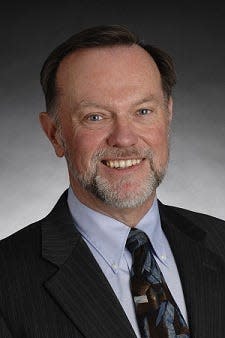Nagy: Texas Tech Study Abroad helps America's global leadership

For the first time in its 100-year history, Texas Tech made a “Top 10” list which will contribute more to America’s global position and security than TTU’s prominence in any college sports poll. This year’s “Open Doors” report, in which 630 US institutions participated, ranked TTU 10th overall among “Leading Institutions by Study Abroad (Total)” and 7th among “Doctoral Institutions/short-term duration programs.”
Open Doors is a respected annual report, published by the Institute of International Education (IIE) and funded by the US Department of State, which includes the most comprehensive data on international students studying in the US and American students doing Study Abroad (SA).
So why is SA important – to the student and the nation? As COVID showed painfully, our world has been “globalized” in supply chains, but it extends way beyond just that area. The US, as the world’s leading nation, is central to global networks related to finance, trade, communication, transportation, technology, and political alliances needed to keep malign powers from harming us. To maintain our leadership in these sectors, we need Americans who are globally competent and can deal with these issues in the international arena with an understanding of foreign cultures, practices, and languages. Nothing – with the possible exception of a Peace Corps tour – can prepare American students to succeed in these areas as much as an SA experience. Today’s students and universities appreciate that SA programs contribute significantly to global awareness, global competence, cultural/language expertise, unique life experiences, and better career opportunities. And yes, even just “seeing the world” is a major reason students study abroad, for as St Augustine said: “The world is a book and those who don’t travel read only one page.”
And I can affirm that students coming out of TTU are absolutely competitive with those coming out from any university in the country. While I was at TTU, I had the opportunity to advise many students interested in international careers, with SA as a stepping stone. I’ve kept up with a number, and I’ve been delighted at how successful they’ve been in their careers, whether in the public or private sectors.
One dramatic example of how SA can benefit one’s career involves a friend who has served as Canada’s Ambassador to a number of African countries. He became interested in Africa while on an SA program in Accra, Ghana during his university days. As it happened, his roommate for the semester ended up becoming the President of Ghana, giving my friend unrivaled influence among all foreign ambassadors.
TTU’s achievement is a huge and significant honor for our university, which even a few decades ago had negligible participation in global engagement, but has recently entered the ranks of leading institutions. When I first came to TTU as a student in 1966, “international” meant going to Oklahoma. Even in 2003, when I came back to serve as Vice Provost for International Affairs, certain Colleges – such as Engineering – were opposed to sending their students abroad, considering it a waste of their time. But how things changed! In 2013 it was Engineering, under the visionary leadership of Dean Al Sacco, which became the first College on campus (and first Engineering school in the U.S.) to require international experience for all its students. The driving force, according to Sacco, were leading U.S. Engineering firms which wanted their employees to have global competence. The program continues to thrive under Assoc Dean George Spoth, with Engineering students representing 45% of all TTU SA participants this past year.
Some others were key to TTU’s transformation from a laggard in global engagement to a trail blazer. Dr. Idris Traylor and former TTU President David Schmidly brought the world class International Cultural Center to the campus in 1996. Former President Donald Haragan helped launch TTU’s Seville Center in 2001. And current President Lawrence Schovanec – exhibiting the type of courageous entrepreneurial spirit rare among academic administrators – seized the opportunity for a private/public partnership to start a degree granting university branch campus in Costa Rica in 2018.
Schovanec has been a consistent supporter of TTU’s comprehensive internationalization – as Dean of Arts & Sciences, then Provost, and now as President. TTU’s Office of International Affairs (OIA) administers the SA program – and the office has been blessed with exemplary leadership. Under SA Director Whitney Longnecker and former Vice Provost Sukant Misra SA participation increased significantly, and now it’s up to recently named Vice Provost Elizabeth Trejos-Castillo to take the program to the next level. With (hopefully) COVID behind us – which devastated SA numbers across the country – TTU should soon be able to achieve a long-held goal of sending 10% of our students on SA programs.
As TTU continues to reach new levels of excellence in academics, outreach, research, diversity, and athletics, I wanted to highlight an area which may be unfamiliar to many readers, but which can significantly impact our nation and the world. The 21st century will present difficult challenges for our country; maintaining our global leadership will be essential for keeping our way of life and our liberties and freedoms. Global Red Raiders will help!
This article originally appeared on Lubbock Avalanche-Journal: Nagy: Texas Tech Study Abroad helps America's global leadership
